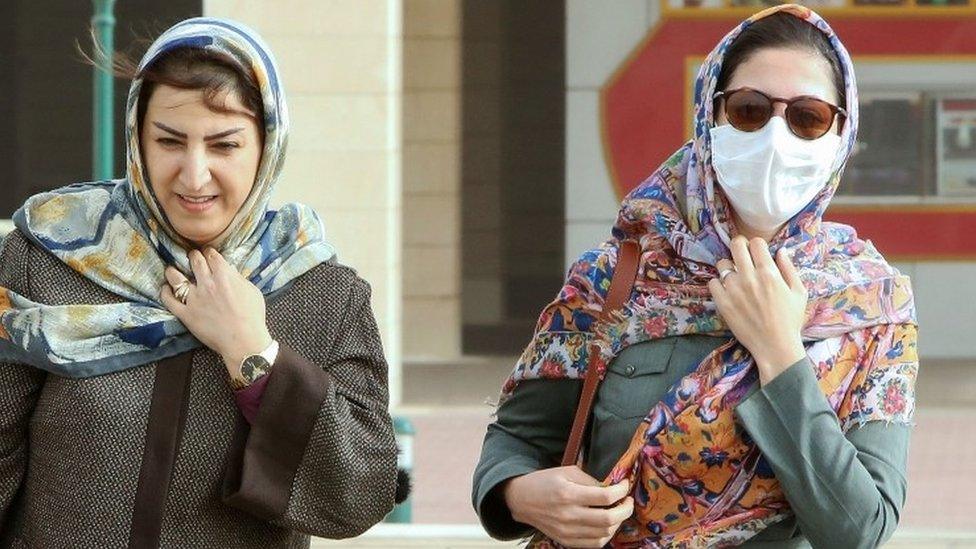Is coronavirus coming between people and their faith?
- Published
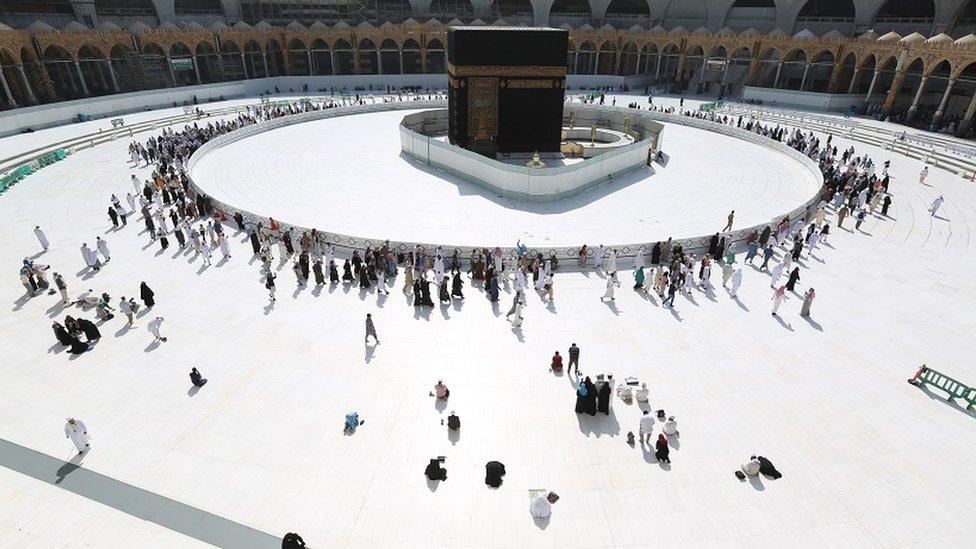
The number of visitors at Mecca's Grand Mosque has dropped drastically
As concern over the spread of coronavirus grows, people around the world are changing the way they do things.
Some have cut back on travel plans and are avoiding crowded spaces. Others have dropped greetings like handshakes and hugs for elbow bumps and foot shakes.
Churches, mosques, temples and synagogues are also changing rituals in an effort to contain the spread of the virus.
So how easy is it to maintain the sense of spiritual connection when the way you worship has to change?
Christianity

Pope Francis live streamed Sunday prayers because of coronavirus concerns
While the whole of Italy is effectively on lockdown, one group of people is being urged to get out and visit others.
Pope Francis has urged priests to have the "courage to go out and visit the sick" and to "accompany the medical staff and volunteers in the work they do".
They will however need to take precautions such as keeping at least a metre (about 3ft 4in) away from other people and avoiding physical contact.
The Pope chose to live-stream his traditional Sunday message in an effort to reduce crowds at the Vatican.
Catholic churches from Ghana to the US and Europe have changed the way they carry out Mass in an effort to stop infection.
Priests now place the wafer in people's hands rather than on their tongues, and have stopped giving wine in the communal chalice.
Instead of shaking hands during the sign of peace, members of the congregation are being asked simply to pray for the person sitting next to them.
But while they may understand why such steps are necessary, some still have a sense of loss.
Alexander Seale is a French journalist living in London.
"There isn't the same joy as before," he tells me, "not doing the sign of peace and not taking communion in the mouth is like removing a part of the Mass basically.
"It's a shame but I understand that these measures have to be taken."
One Church that is not changing the way it carries out communion is the Greek Orthodox Church.
It will continue giving the sacrament using the same spoon for worshippers.
In a statement the church's ruling body the Holy Synod said: "For the members of the Church, attending the Holy Eucharist … certainly cannot be a cause of disease transmission".
It called for the faithful to pray against the spread of the deadly virus.
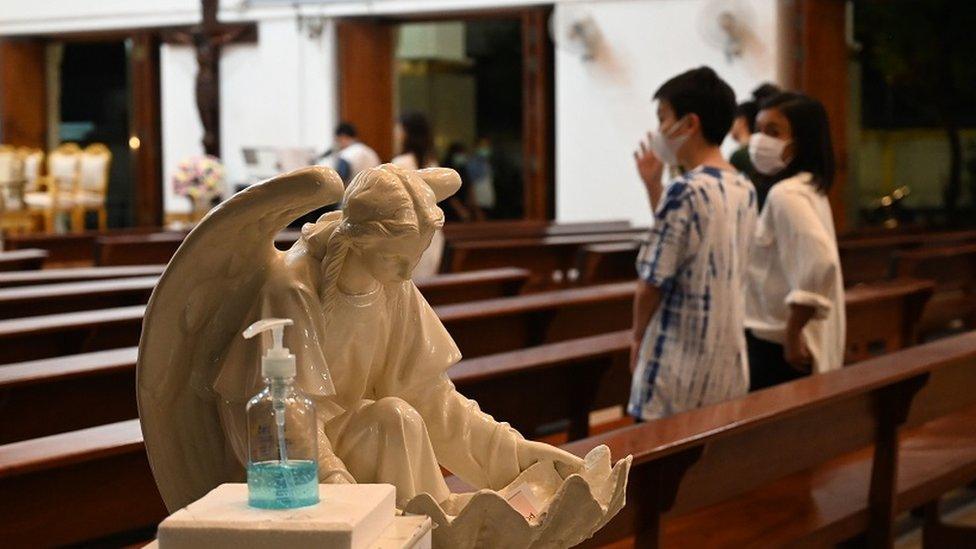
Churches around the world have made changes because of coronavirus
In the US, hundreds of people who attended Christ Church in Georgetown, Washington DC, have been told to self-quarantine after the rector of the church was confirmed as the first known coronavirus patient in the district.
The Reverend Timothy Cole tested positive for the virus on Saturday, and is under quarantine with his family.
It's been reported that about 550 people are thought to have been at the service he oversaw on 1 March, and that he administered communion.
It was the refusal to make adjustments to worship that has been blamed for increasing the spread of the coronavirus in South Korea.
More than half of all cases in the country have been linked to a fringe Christian group called the Shincheonji Church of Jesus.
It's thought that practices such as sitting very close together meant the virus spread more quickly among members, who then travelled around the country and infected others.
Church leaders have been accused of withholding the names of members, hindering authorities as they tried to identify infected people and contain the spread of the virus.
Islam
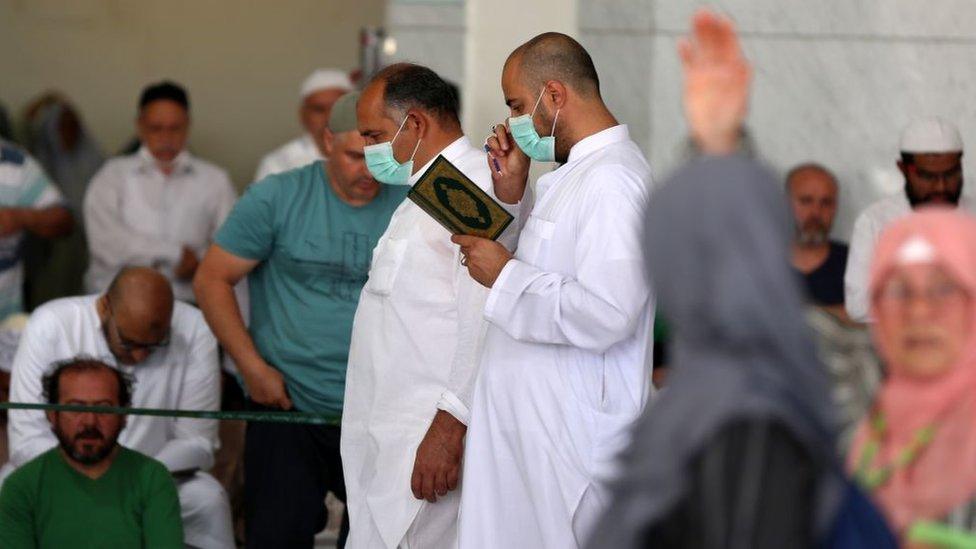
Worshippers pray in front of Mecca's Grand Mosque after it was closed for sterilisation
The Grand Mosque in Mecca is usually packed with thousands of Muslim pilgrims, but there has been a dramatic fall in visitors to what Islam holiest sites.
Although the Grand Mosque has re-opened after being closed for sterilisation, there is now a barrier around the sacred Kaaba in the centre of the mosque to stop people from touching it.
A ban on foreign pilgrims to both Mecca and Medina is still in place.
Devotees from around the world would usually be visiting for Umrah pilgrimage, which unlike Hajj can be performed at any time of the year.
About eight million Muslims make the trip annually.
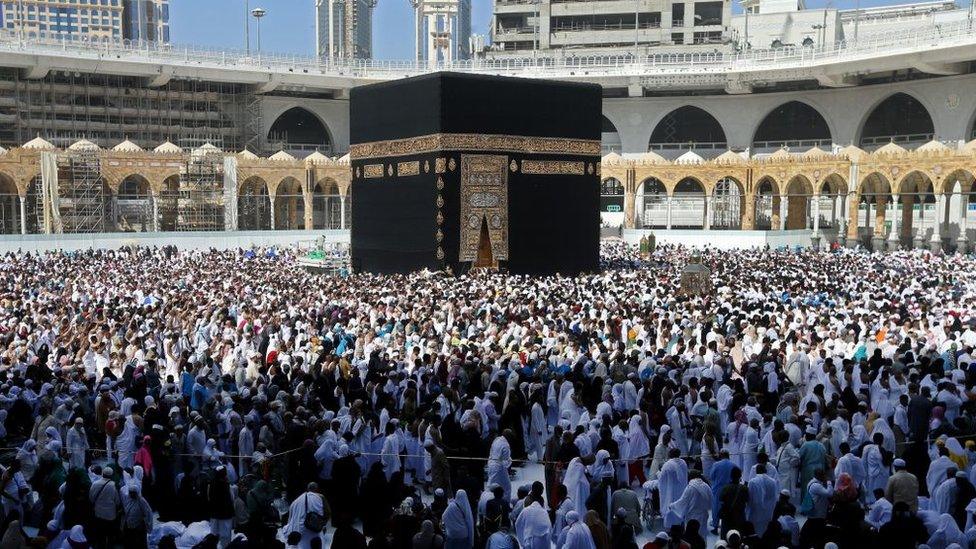
Saudi's holy sites would normally be packed with Muslim pilgrims
Hadiza Tanimu Danu runs a travel agency in Nigeria which specialises in trips to Mecca, and says reaction to the foreign visitor ban has been mixed.
"People are sad," she tells me. "You know it's Umrah, and everybody loves going for the purpose for worshipping."
It may not be just Umrah which is affected.
"Some are worried that 'OK, what if this extends to Ramadan, what if this extends to Hajj, what's going to happen?'" she says.
The Saudi authorities say these measures are temporary and have not indicated that there are plans to disrupt the Hajj.
Some religious practices which could spread the virus have continued.
There was alarm around the world recently when videos of Iranians licking Shia shrines were shared on social media.
In one, a man is seen at the Masumeh shrine in Qom saying "I'm not scared of coronavirus", before licking and kissing the gates. Some people believe the shrines have divine powers and can help cure diseases.
Allow X content?
This article contains content provided by X. We ask for your permission before anything is loaded, as they may be using cookies and other technologies. You may want to read X’s cookie policy, external and privacy policy, external before accepting. To view this content choose ‘accept and continue’.
Two of the men involved are facing jail as a result of their actions, but some Iranians say the religious sites should have been closed altogether.
For many Muslims, though, it is the smaller changes in day-to-day behaviour that they are focused on.
For example, as South Africa grapples with its first confirmed cases of the virus, religious leaders used Friday prayers as an opportunity to advise people about taking precautions.
BBC Africa's Mohammed Allie says that worshippers at his mosque were advised not to shake hands or hug after the service.
"It's going to take some time to get used to it," he says.
"People were still shaking hands after mosque, not because they have ignored the message, but because it's a reflex action."
He says some people have started touching feet instead of shaking hands, and he has started using fist bumps.
"People are slowly but surely starting to make adjustments," he says, adding that he and fellow worshippers have been advised to bring their own prayer mats to next Friday's prayers.
Hindus
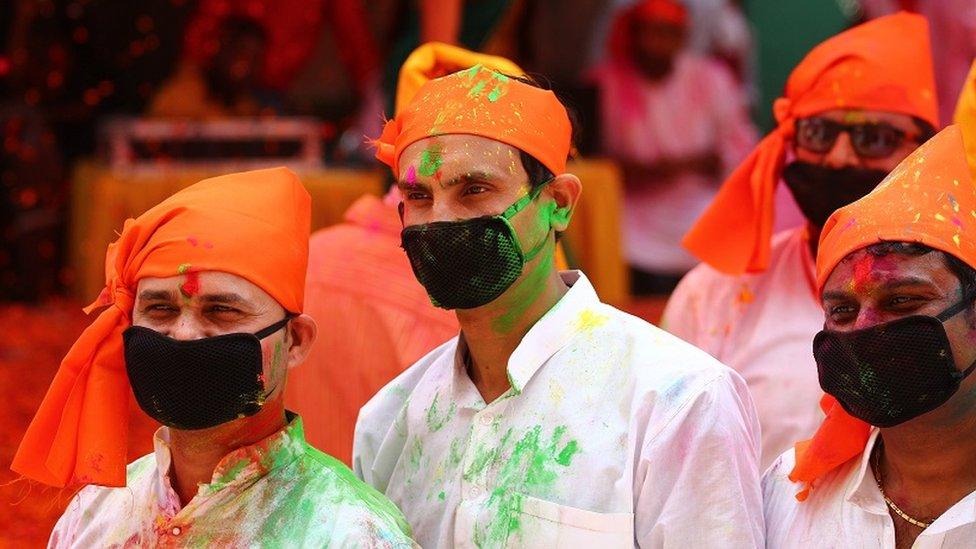
Hindus in India took precautions against Covid-19 during the Holi celebrations in Uttar Pradesh
For Hindus, this is the time of year when Holi - the "festival of colours" - is celebrated. It commemorates the triumph of good over evil, as well as spring, love and new life. As part of the festivities, people throw coloured powder in the air and paint each other's faces.
India's Prime Minister Narendra Modi said he would not be taking part in public celebrations, and advised people to avoid large gatherings.
But many people did take part in festivities over the weekend, albeit with some precautions taken, such as wearing face masks.
For others though, it was a risk they were not prepared to take.
Nicky Singh lives in Amritsar, in the Indian state of Punjab. He says he stayed at home, preferring to exchange wishes by phone.
He tells me that it is only "the brave or the foolhardy indulging [in celebrations], but the energy which is synonymous with Holi is missing".
He adds: "A harmless sneeze is enough to ring the alarm bells here, that's the general feeling around.
"I feel happy that I [chose] safety over celebrations."
Judaism
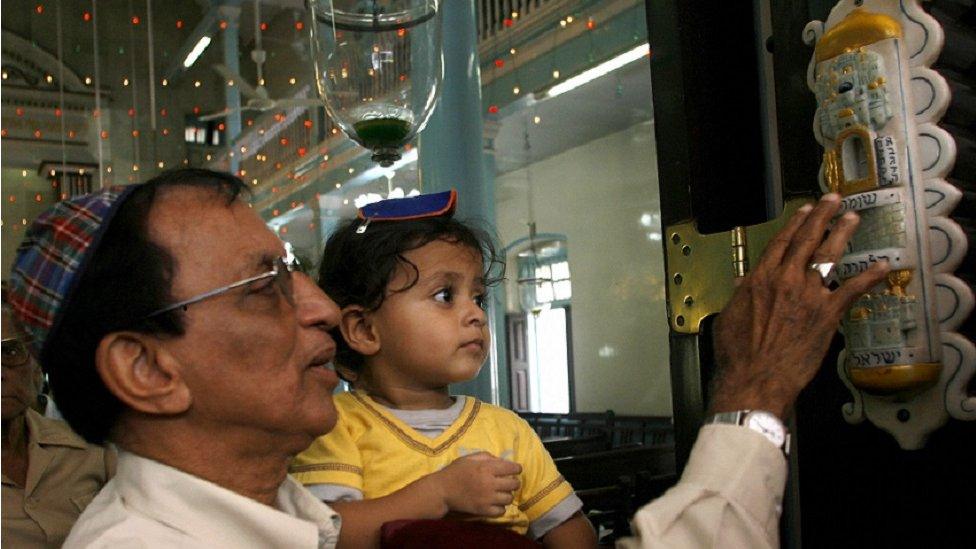
Many Jews traditionally touch or kiss when they enter a building or room
How do you tell people not to hug a grieving widow at a funeral? That's something that Rabbi Jackie Tabick, from London's West Central Liberal Synagogue, told me she was grappling with.
"It's a really tough one," she explains.
"I think I'm going to say something like: 'I know that everybody wants to physically express their love for the widow, but really the best way that you can express your love these days - and I know she will understand too - is to talk to her, nod to her, but don't touch, because it's really not the right thing to do at the moment."
She is also putting plans in place to try to do lessons and services online, which many reform and liberal synagogues already do.
Last week, Israel's chief rabbi David Lau issued a statement advising that people should not touch or kiss the mezuzah. These are scrolls with religious verses which are placed on doorposts of homes, and which people touch or kiss when entering a building or a room.
The Conference of European Rabbis has also advised people to not kiss items such as Torah scrolls.
Although Rabbi Tabick says that not being able to kiss the mezuzah is not a major thing in Jewish life, "the trouble is that certain things are a matter of routine".
"Maybe it will be good for us to re-examine routine rituals that we have. Maybe it will be helpful to us to rethink how we can replace them.
"Certainly the most important thing is to make sure that we have support for each other, and maybe [we should be] emphasising that as a way of connecting to God."
- Published10 March 2020
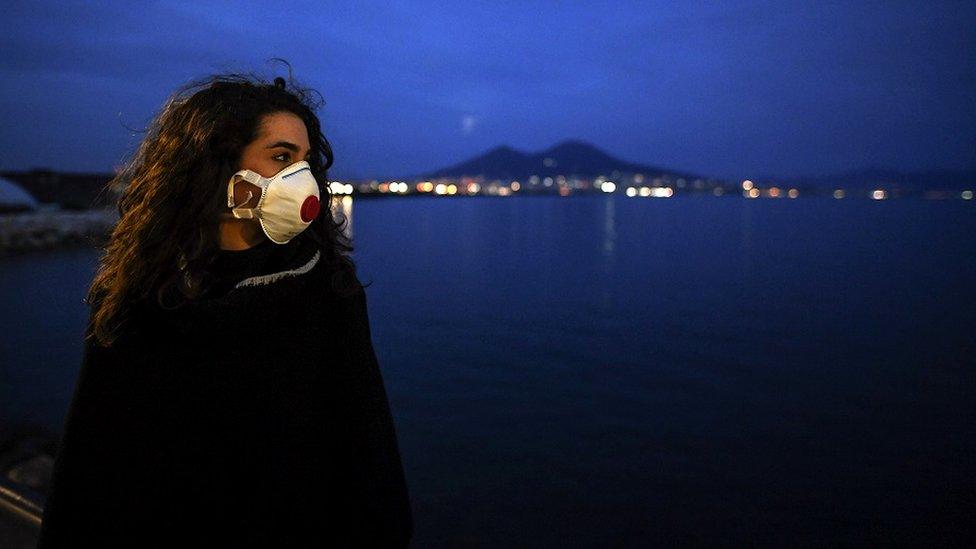
- Published10 March 2020

- Published3 March 2020
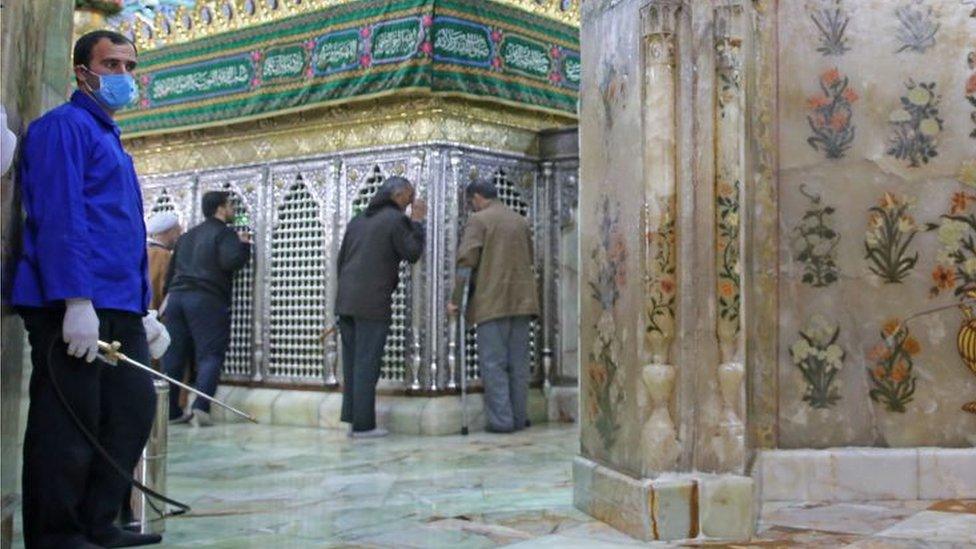
- Published27 February 2020
